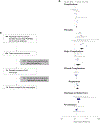Impact of frailty on outcomes in surgical patients: A systematic review and meta-analysis
- PMID: 30509455
- PMCID: PMC6536365
- DOI: 10.1016/j.amjsurg.2018.11.020
Impact of frailty on outcomes in surgical patients: A systematic review and meta-analysis
Abstract
Importance: Age has historically been used to predict negative post-surgical outcomes. The concept of frailty was introduced to explain the discrepancies that exist between patients' chronological and physiological age. The efficacy of the modified frailty index (mFI) to predict surgical risk is not clear.
Objective: We sought to synthesize the current literature to quantify the impact of frailty as a prognostic indicator across all surgical specialties.
Data sources: Pubmed and Cochrane databases were screened from inception to 1 January 2018.
Study selection: Studies utilizing the modified Frailty Index (mFI) as a post-operative indicator of any type of surgery. The mFI was selected based on a preliminary search showing it to be the most commonly applied index in surgical cohorts.
Data extraction and synthesis: Articles were selected via a two-stage process undertaken by two reviewers (AP and DS). Statistical analysis was performed in Revman (Review manager V5.3). The random-effects model was used to calculate the Risk Ratios (RR).
Main outcome(s) and measure(s): The primary outcomes: post-operative complications, re-admission, re-operation, discharge to a skilled care facility, and mortality.
Results: This meta-analysis of 16 studies randomizes 683,487 patients, 444,885 frail, from gastrointestinal, vascular, orthopedic, urogenital, head and neck, emergency, neurological, oncological, cardiothoracic, as well as general surgery cohorts. Frail patients were more likely to experience complications (RR 1.48, 95%CI 1.35-1.61; p < 0.001), major complications (RR 2.03, 95%CI 1.26-3.29; p = 0.004), and wound complications (RR 1.52, 95%CI 1.47-1.57; p < 0.001). Furthermore, frail patients had higher risk of readmission (RR 1.61, 95%CI 1.44-1.80; p < 0.001) and discharge to skilled care (RR 2.15, 95%CI 1.92-2.40; p < 0.001). Notably, the risk of mortality was 4.19 times more likely in frail patients (95% CI 2.96-5.92; p < 0.001).
Conclusions: and Relevance: This study is the first to synthesize the evidence across multiple surgical specialties and demonstrates that the mFI is an underappreciated prognostic indicator that strongly correlates with the risk of post-surgical morbidity and mortality. This supports that formal incorporation of pre-operative frailty assessment improves surgical decision-making.
Copyright © 2018 Elsevier Inc. All rights reserved.
Conflict of interest statement
Financial Disclosure Statement
None of the authors have any conflicts of interest to declare.
Figures
References
-
- Census Bureau. Table 3. Projections of the Population by Sex and Selected Age Groups for the United States: 2015 to 2060 [Internet] Census Bureau; 2014. Available at: https://www2.census.gov/programs-surveys/popproj/tables/2014/2014-summar.... Accessed March 23, 2018
-
- Kwok AC, Semel ME, Lipsitz SR, et al. The intensity and variation of surgical care at the end of life: a retrospective cohort study. Lancet 2011;378(9800):1408–13. - PubMed
-
- Robinson T, Eiseman B, Wallace JI, et al. Redefining geriatric preoperative assessment using frailty, disability and co-morbidity. Ann Surg 2009; 250(3):449–455. - PubMed
-
- Fried LP, Tangen CM, Walston J, et al. Frailty in older adults: evidence for a phenotype. J Gerontol A Biol Sci Med Sci 2001;56(3):M146–156. - PubMed
Publication types
MeSH terms
Grants and funding
LinkOut - more resources
Full Text Sources
Medical



